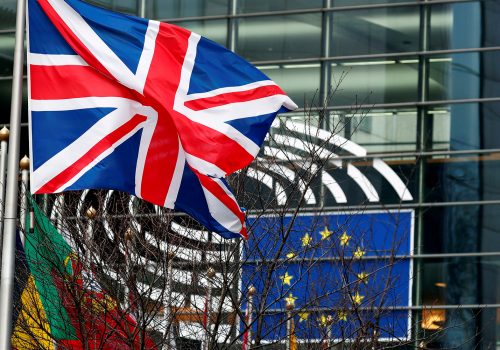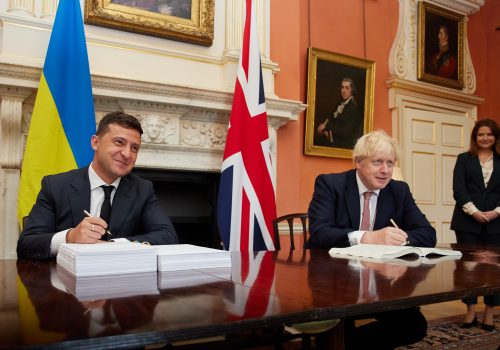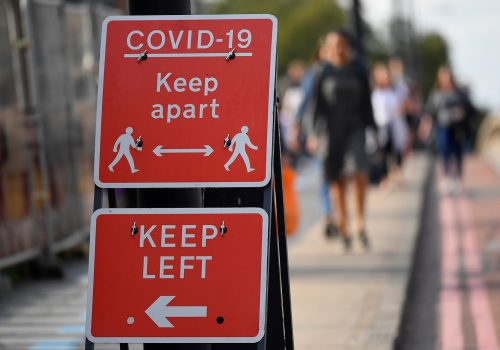FAST THINKING: There’s finally a Brexit deal. Now what?
JUST IN
Four years of negotiations. Much political acrimony. The fall and rise (and fall and rise) of British premiers. Through it all, a British public wondering what their future would look like and when they could finally move on from their limbo. A Brexit trade deal is here at last. How should we feel?
TODAY’S EXPERT REACTION COURTESY OF
- Hung Tran: Senior fellow in the GeoEconomics Center
- Julia Friedlander (@jfriedlanderdc): C. Boyden Gray senior fellow and deputy director in the GeoEconomics Center
- Ben Haddad (@benjaminhaddad): Director of the Future Europe Initiative
What’s in the deal—and what isn’t
- Hung breaks it down: What ultimately “pushed the post-Brexit trade agreement over the finish line” was UK-EU compromises “over fish—specifically deciding how many of them EU fishing boats can catch in UK waters—and over maintaining a ‘level playing field’ with regards to state aid and environmental and labor standards.” Under the accord, the trade of goods between the United Kingdom and EU “will remain free of tariffs and quotas but will be subject to custom and regulatory border checks.”
- Here Hung strikes a note of caution. “The agreement also leaves many details open for disputes in the future,” he says, on issues ranging from financial regulation to processes for registering grievances. And in the end, the UK-EU economic relationship will be “less efficient and more costly than it was within the [EU] single market.”
- But it could have been worse. Britain’s economy has been reeling from the effects of Brexit and the pandemic, Hung tells us, and the deal will help ease the pain. The agreement “allows Brexit to proceed in the least disruptive way possible, while preserving amicable relationships between the United Kingdom and EU,” he says. More good news: Both sides say they want to “cooperate in other spheres such as security and crime-fighting.”
Let’s take a moment, then, to raise our glasses
- It’s the season for appreciation, and Julia wants to share some with the bureaucrats who made the best of a difficult situation. “Behind all the political pageantry that has surrounded the ‘Brexit years,’ it has always been the details that mattered,” she tells us. “Fishing quotas may have been the final holdout, but let’s not forget the quieter resolution of thousands of regulatory and financial agreements that had evolved over the almost fifty years of the United Kingdom’s EU membership. This is less a tribute to high-level political swagger than the patient work of EU and UK civil servants, who waded through uncertainty and fine print.”
- She adds: “The sheer brainpower it took to get to this point can now be redirected to future governance challenges, of which there are many.”
- It’s also worth remembering, Julia notes, that for Britons, a no-deal Brexit would have provided one final gut-punch to wrap up 2020. “There was a reason negotiators held out as long as they did, and it wasn’t about political niceties,” she says. “No one’s economic projections were definitive, but a crash-out could have claimed up to 10 percent of GDP, on top of the COVID recession. This would have set the UK economy back for a generation.”
And now it’s finally time to move on
- Ben calls the deal a victory for the optimists: “Those who bet, time and again, on divisions among EU members were wrong.”
- But getting here has required expending energy “on these inward-looking issues and divisions,” he notes, when there are “pressing global challenges” and “Europeans need a strong and internationalist United Kingdom at their side.”
- “The United Kingdom is one of Europe’s key defense and economic players,” with an outlook on big strategic issues such as climate change and the China challenge that is “close to major European capitals,” Ben tells us. The United Kingdom and other European powers could cooperate more closely not just through NATO but also through formats such as the E3 group and a proposed European Security Council, he says. “The United States should celebrate this deal and encourage EU-UK rapprochement.”
Further reading
Wed, Dec 23, 2020
FAST THINKING: Will a Brexit deal be home for Christmas?
Fast Thinking By
The European Union's chief Brexit negotiator said yesterday that a trade deal could come before Christmas. That would be quite the gift for British Prime Minister Boris Johnson, who faces the prospect of his country "crashing out" of its old trading arrangements with the EU.
Mon, Oct 12, 2020
UK and Ukraine sign historic post-Brexit free trade deal
UkraineAlert By
The jury is still out on the economic impact of Brexit, but Ukraine emerged in early October as an unlikely early beneficiary of Britain’s EU exit by signing a landmark partnership agreement including free trade.
Thu, Oct 15, 2020
COVID-19 and British unity
New Atlanticist By John M. Roberts
The coronavirus crisis is straining British unity as officials in the North of England, Scotland, Wales, and Northern Ireland clash with Boris Johnson's government over lockdowns and economic support measures.
Image: British Prime Minister Boris Johnson leaves after a news conference in Downing Street on the outcome of the Brexit negotiations, in London, Britain December 24, 2020. Paul Grover /Pool via REUTERS


